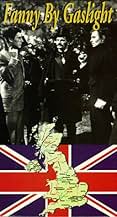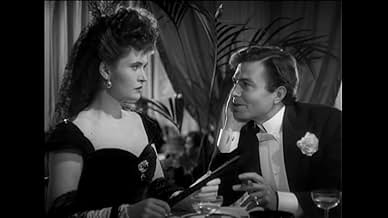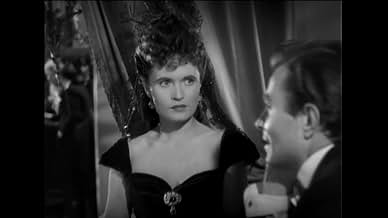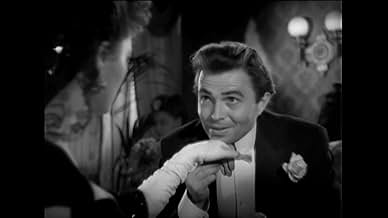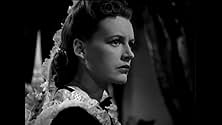Agrega una trama en tu idiomaFanny's father dies in a fight. Her family runs a brothel. Her real father is a politician. She falls for his advisor Harry. Lord Manderstoke's interference causes conflicts between classes.... Leer todoFanny's father dies in a fight. Her family runs a brothel. Her real father is a politician. She falls for his advisor Harry. Lord Manderstoke's interference causes conflicts between classes. Tragic events occur due to the Lord's schemes.Fanny's father dies in a fight. Her family runs a brothel. Her real father is a politician. She falls for his advisor Harry. Lord Manderstoke's interference causes conflicts between classes. Tragic events occur due to the Lord's schemes.
- Dirección
- Guionistas
- Elenco
- Maid
- (sin créditos)
- Dirección
- Guionistas
- Todo el elenco y el equipo
- Producción, taquilla y más en IMDbPro
Opiniones destacadas
Of course it is Phyllis Calvert as Fanny who dominates the film, ably supported by a well-chosen supporting cast. I much regret that my favorite contemporary British director, Ken Russell, was never able to realize his last major project -a new version of "Moll Flanders", but seeing this 1944 costume picture some 80 years after courtesy of YouTube makes up for it thanks to a very fine British print.
This film is a lovely story...very much like an old fashioned love story. This is NOT meant as an insult...such stories can be very satisfying if well written and the characters enjoyable...which they definitely are here.
'Fanny By Gaslight' does try - it manages to get subject matter into it that must have seemed very daring in the 1940s, it starts well and grows into some good scenes between Fanny ('only Hooper') and her employer's wife. Then - perhaps because of Granger, IMO - it starts to backfire badly and become a bore. A great disappointment.
The best works of Charles Dickens like David Copperfield, Nicholas Nickleby, and Great Expectations have the common thread of a young man of limited means making his way in the world who with a combination of hard work and good circumstances comes out on top at the end of the story. Fanny By Gaslight is just that kind of a story, except that Dickens would never have his protagonist be a woman. But Fanny Hooper as played by Phyllis Calvert is as good a Dickens hero as you will ever find.
When Calvert returns from boarding school her father, John Laurie, is killed in a fight ejecting a drunken James Mason from his establishment which is just this side of a brothel. When he dies she finds out that Laurie was not her real father, that she is the daughter of a prominent politician Stuart Lindsell. She's taken into his house as a maid. Calvert also makes the acquaintance of rising young politician Stewart Granger who is a protégé of Lindsell and Granger falls big time for Calvert.
Eventually all this becomes known about Calvert's background and it leads to an inevitable climax between Mason and Granger. How it gets to that point is the crux of the film.
Several incidents from the 19th century are used. The sex scandals are pieced from those involving Charles Dilke and Charles Parnell. Lindsell's suicide, jumping in front of a train is a recreation of the death of William Huskisson killed accidentally though by George Stephenson's newly invented locomotive.
Calvert and Granger are a winning pair of lovers and James Mason is one hateful aristocratic villain, a privileged man who lives to enjoy his privileges at the expense of others as Phillip Barry said.
I was surprised at how well Fanny By Gaslight holds up today. In fact the Hays Office had it banned from the USA for a while. Maybe that's its secret.
My original intention was to see James Mason and Stewart Granger face off against each other. Instead, I found myself falling in love with the heroine played by Phyllis Calvert, who immediately became my favorite British actress.
The story may smack of soap opera; I've followed several in my time, and yet this story, admittedly overdone, I found to be very sympathetic, and immediately found myself falling in with the main protagonist, and wishing her to eventually prevail, despite all the adversity she had to face from so many individuals.
I have continued to love this movie and have gone back to seeing it many times. I admit that Stewart Granger is rather wooden at times and James Mason appears only at certain strategic moments. However, the player whom I found myself yearning more to see was Jean Kent; fortunately for her, she was given full opportunity to display her complete diversity in subsequent films, many of which I have also seen. (I would like to comment that Ms. Kent is happily still with us, approaching 90 as of next year.)
I agree that the moment where Stuart Lindsell as Fanny's natural father is about to kill himself because of pressures exerted by his erstwhile wife having become too much is right out of a horror story, at the moment where one sees those multiple mirror images.
Certain other players in this film I have also found to be quite believable considering the context - Wilfrid Lawson as Chunks, Amy Veness as Mrs. Heaviside, and perhaps one or two others.
In addition to James Mason, the individual contributions by Margaretta Scott and Cathleen Nesbitt are also sufficiently believable to invite our intense dislike, as each throwing another obstacle in the path of our heroine.
I understand that these impressions are purely individual; as with any work of art, we experience such in our own way. In my case, it made a very warm, positive impression on me - I cannot say exactly why. I would recommend it to anyone who likes high Victorian melodrama, mindful that I am not necessarily in a majority with my impression, but that is how I am. Chacun e son gout, as they say.
I just finished viewing Madonna of the Seven Moons, another film in this same Gainsborough series, and also featuring Phyllis Calvert, Jean Kent,and Stewart Granger. While this latter is a fascinating story based upon a multiple personality, I found it to be inferior in its cohesiveness and ability to draw the viewer in, compared with Fanny by Gaslight, which I have just commented on. I could easily imagine that the superior direction by Anthony Asquith may have something to do with it.
¿Sabías que…?
- TriviaThe film was originally banned in the USA because it transgressed the Hays Purity Code.
- Citas
Clive Seymour: Fanny. I don't know how to begin to tell you this. I promised your mother. William Hopwood was not your father.
- Créditos curiososOpening credits prologue: LONDON
1870
- ConexionesFeatured in The Ultimate Film (2004)
Selecciones populares
- How long is Man of Evil?Con tecnología de Alexa
Detalles
- Tiempo de ejecución
- 1h 47min(107 min)
- Color
- Relación de aspecto
- 1.33 : 1

